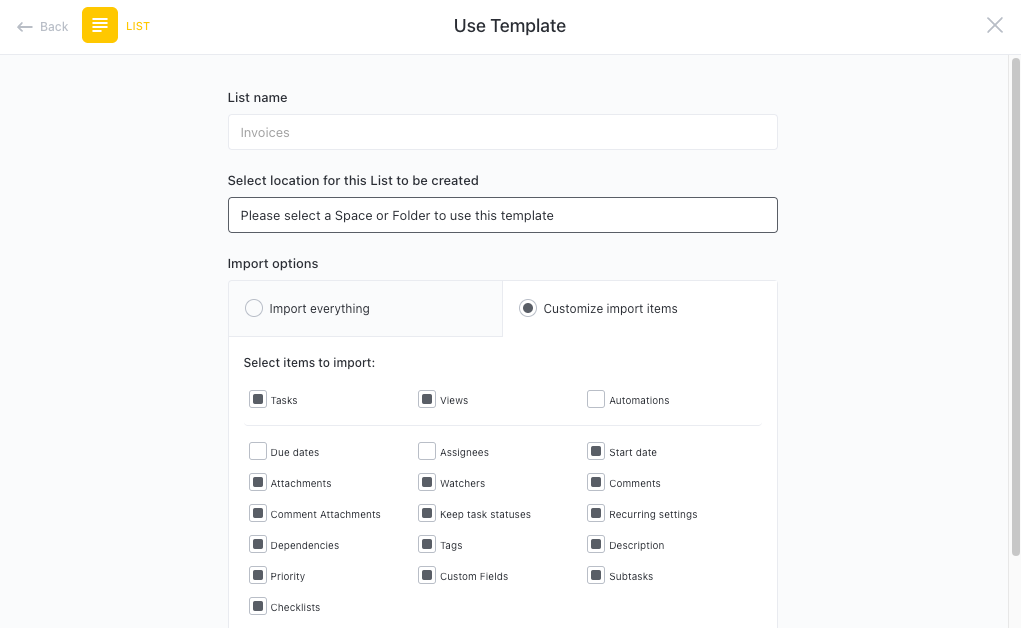Setting financial goals for your team is crucial for driving growth and success in your organization. But without a clear and organized plan, it can be challenging to stay focused and track progress. That's where ClickUp's Finance Teams Goal Setting Template comes in handy!
With this template, your finance team can:
- Define and align financial objectives with the company's overall goals
- Break down goals into actionable tasks and milestones for easy execution
- Monitor and track progress to ensure you stay on target
- Collaborate and communicate effectively with team members to keep everyone in the loop
Take your finance team to new heights by using ClickUp's Finance Teams Goal Setting Template. Start achieving your financial goals today!
Benefits of Finance Teams Goal Setting Template
Setting goals is crucial for finance teams to drive success and contribute to the financial health of the company. With the Finance Teams Goal Setting Template, you can:
- Align your team's objectives with the overall financial goals of the organization
- Streamline financial planning and budgeting by setting clear targets and milestones
- Track performance and measure progress towards financial targets
- Foster collaboration and accountability within the finance team
- Improve communication and coordination with other departments for better cross-functional alignment
Main Elements of Finance Teams Goal Setting Template
ClickUp's Finance Teams Goal Setting Template is designed to help finance teams set and track their goals effectively. Here are the main elements of this template:
- Custom Statuses: Use the 6 different statuses including Complete, Crushing, Off Track, On Hold, On Track, and To Do to track the progress of your goals and keep everyone on the same page.
- Custom Fields: Utilize the 12 custom fields such as “Do you have the skills required to achieve this,“ “Amount of Effort Required,“ and “Realistic deadline“ to provide detailed information about each goal and ensure clarity and accountability.
- Custom Views: Access 5 different views including SMART Goals, Goal Effort, SMART Goal Worksheet, Company Goals, and Getting Started Guide to gain different perspectives on your goals and manage them efficiently.
- Collaboration Tools: Leverage ClickUp's collaboration tools like task assignments, comments, and file attachments to ensure seamless communication and collaboration within your finance team.
How to Use Goal Setting for Finance Teams
Setting financial goals for your team is crucial for success. By using the Finance Teams Goal Setting Template in ClickUp and following these steps, you can ensure that your team is aligned and working towards the same objectives.
1. Define your financial objectives
Start by clearly defining your financial objectives for the team. Do you want to increase revenue, reduce expenses, improve cash flow, or achieve a specific profit margin? Setting clear and measurable goals will provide focus and direction for your team.
Use Goals in ClickUp to create and track your financial objectives. Set specific targets and assign them to team members.
2. Break down your goals into actionable tasks
Once you have defined your financial objectives, break them down into smaller, actionable tasks. Identify the specific actions that need to be taken to achieve each goal. This will help your team understand what needs to be done and create a roadmap for success.
Use tasks in ClickUp to create action items for each goal. Assign tasks to team members and set due dates to keep everyone accountable.
3. Assign responsibilities
Determine who will be responsible for each task. Assign team members based on their expertise and availability. Clearly communicate the responsibilities and expectations to ensure that everyone knows their role in achieving the financial goals.
Use custom fields in ClickUp to assign responsibilities to team members. This will help you track progress and ensure that each task is being taken care of.
4. Set deadlines
Establish realistic deadlines for each task. Consider the complexity of the task, available resources, and other priorities. Setting deadlines will help keep your team focused and ensure that progress is being made towards the financial goals.
Use the Calendar view in ClickUp to schedule deadlines for each task. This will provide a visual representation of the timeline and help you manage your team's workload.
5. Review and adjust
Regularly review the progress towards your financial goals. Monitor the completion of tasks, evaluate the results, and make any necessary adjustments. Celebrate milestones and provide feedback to keep your team motivated and engaged.
Use Dashboards in ClickUp to track the progress of your financial goals. Monitor key metrics and visualize the performance of your team.

Get Started with ClickUp’s Finance Teams Goal Setting Template
Finance teams can use this Goal Setting Template to set and track financial goals, ensuring alignment with the overall objectives of the organization.
First, hit “Add Template” to sign up for ClickUp and add the template to your Workspace. Make sure you designate which Space or location in your Workspace you’d like this template applied.
Next, invite relevant members or guests to your Workspace to start collaborating.
Now you can take advantage of the full potential of this template to set and achieve financial goals:
- Use the SMART Goals View to define Specific, Measurable, Achievable, Relevant, and Time-bound goals
- The Goal Effort View will help you allocate resources and effort required for each goal
- Use the SMART Goal Worksheet to create a detailed plan for each goal, including milestones, budget, and responsible team members
- The Company Goals View will give you an overview of all financial goals across the organization
- Refer to the Getting Started Guide for step-by-step instructions on how to effectively use this template
- Organize goals into six different statuses: Complete, Crushing, Off Track, On Hold, On Track, To Do, to track progress
- Update statuses regularly to keep stakeholders informed of goal progress
- Monitor and analyze goal performance to ensure successful financial outcomes.








